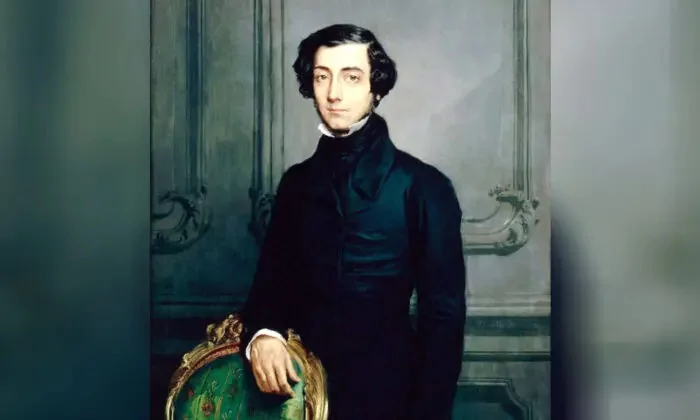If Alexis de Tocqueville returned to America after nearly 200 years, what, once he had freed himself from the tender ministrations of the TSA, would the author of Democracy in America think? It would not take long to discover that he had been right to worry that time would turn two American strengths into weaknesses. Democracy had fostered a “tyranny of the majority.” Individualism had atomized society. But these would not be the most striking changes.
America had acquired an intellectual class. The Americans of 1831 had done without this luxury. Perhaps that was why they made such pleasant company. They had universities back then, but these, as in France, were generally finishing schools for rich halfwits. No change there. Except back then, the university had served the reigning ethos of the society. In America, Tocqueville would notice that the university has reshaped the other institutions of American life (the bureaucracy, the media, even the churches) in its image. The tail is wagging le chien.
Tocqueville knew a revolution when he saw one, though this didn’t always help him. The revolution of 1789 had reduced his aristocratic family to citizens and nearly reduced his parents by a head at the guillotine. The Bourbon restoration of 1815 returned his father to noble status. Tocqueville sought a posting in America after backing the wrong side in the liberal revolution of 1830. He eventually became foreign minister after the revolution of 1848 but again backed the losers in the imperial restoration of 1851. Returning to his books, he described in The Ancien Régime and the Revolution (1856) how the radical dynamic had emerged from reforms within the system. The revolution accelerated these trends and caused them, in the new parlance of the 1830s, to jump the tracks.

As Tocqueville eased himself out of a marijuana-stinking Uber and surveyed the tent encampment on the campus lawn, he realized at once what had occurred. His contemporary Karl Marx had claimed that revolutions are caused by misery, but Tocqueville was always more worried about what Americans came to call the “revolution of rising expectations.” Societies, he wrote in 1856, do not always fall into revolution by going from bad to worse. “It happens most often that a people, which has supported without complaint, as if they were not felt, the most oppressive laws, violently throws them off as soon as their weight is lifted.”
Today’s students were squeezed by both of these revolutionary pressures. Their expectations remained sky-high in the American tradition, but they had little reason to believe that they will earn more than their parents do. Tocqueville had noticed that creating a large number of young people with useless degrees and thwarted desires is a recipe for revolution. Perhaps he would call his next book Socialism in America.
He would have appreciated Peter Turchin’s theory of “elite overproduction” as a driver of present American discontent. He would not have been surprised to find that Turchin is rarely found on university syllabi. Tocqueville understood that liberal politics is a war for control of the institutions. As an economic libertarian, he would have been pleased to see Elon Musk buy Twitter as a defense against speech control.
Tocqueville would have been staggered, however, to discover that a people as patriotic as the Americans had allowed their leading institutions, and their public life more generally, to be corrupted by foreign influence. The universities had taken a torrent of money from states such as Qatar. The students were in an anti-Jewish furor of the kind that had overtaken German students in the 1820s. Their buzzword, intifada, meant “violently throwing off” in Arabic. But they had no idea who funded the people who supplied their slogans and organized their protests.
The student campaign was run by a network of NGOs (Students for Justice in Palestine, Jewish Voice for Peace, Within Our Lifetime, and Samidoun). The NGOs did not register as 501(c)(3) nonprofit groups, so they avoided laws on financial disclosure. Their structure and funding were largely opaque. A 2024 investigation of Jewish Voice for Peace by NGO Monitor identified “the US-based donors that account for one-third of JVP’s budget” but could not identify where the rest of the money came from. Nor could it identify the sources of income for the NGO’s fiscal sponsor, the Westchester Peace Action Committee Foundation.
CLICK HERE TO READ MORE FROM THE WASHINGTON EXAMINER
Even the government was not immune. When the current president was out of office after 2016, he had set up an institute at the University of Pennsylvania that received millions of dollars in what a congressional committee called “anonymous Chinese donations.” The failure of diplomatic entreaties to the Persians had exposed several advisers as being too close to the other side. One of them, a high-ranking State Department official named Robert Malley, had disappeared as completely as the Man in the Iron Mask.
Tocqueville added two terms to his political vocabulary: astroturfed and foreign influence operation. He frequently heard another American saying, Follow the money. No one wanted to follow it.
